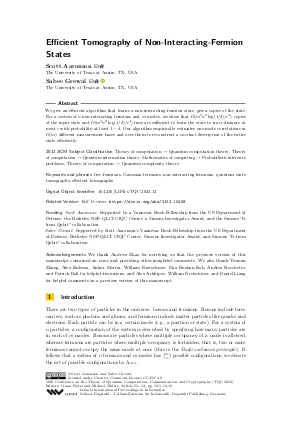@InProceedings{aaronson_et_al:LIPIcs.TQC.2023.12,
author = {Aaronson, Scott and Grewal, Sabee},
title = {{Efficient Tomography of Non-Interacting-Fermion States}},
booktitle = {18th Conference on the Theory of Quantum Computation, Communication and Cryptography (TQC 2023)},
pages = {12:1--12:18},
series = {Leibniz International Proceedings in Informatics (LIPIcs)},
ISBN = {978-3-95977-283-9},
ISSN = {1868-8969},
year = {2023},
volume = {266},
editor = {Fawzi, Omar and Walter, Michael},
publisher = {Schloss Dagstuhl -- Leibniz-Zentrum f{\"u}r Informatik},
address = {Dagstuhl, Germany},
URL = {https://drops.dagstuhl.de/entities/document/10.4230/LIPIcs.TQC.2023.12},
URN = {urn:nbn:de:0030-drops-183222},
doi = {10.4230/LIPIcs.TQC.2023.12},
annote = {Keywords: free-fermions, Gaussian fermions, non-interacting fermions, quantum state tomography, efficient tomography}
}

 Creative Commons Attribution 4.0 International license
Creative Commons Attribution 4.0 International license



